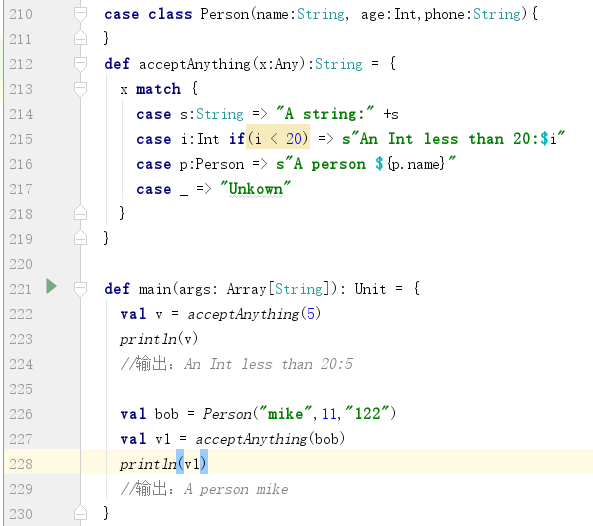scala 学习笔记七 基于类型的模式匹配
1、介绍
Scala 提供了强大的模式匹配机制,应用也非常广泛。
一个模式匹配包含了一系列备选项,每个都开始于关键字 case。每个备选项都包含了一个模式及一到多个表达式。箭头符号 => 隔开了模式和表达式。
先看一个整型值模式匹配的例子

match 对应 Java 里的 switch,但是写在选择器表达式之后。即: 选择器 match {备选项}。
2、基于类型的模式匹配

acceptAnything的参数类型Any允许任何类型的参数,如果向某个方法传递的类型具有多样性,并且没有任何共性部分,那么Any就可以解决此问题。
其它例子
case class Person(name:String, age:Int,phone:String){ } def acceptAnything(x:Any):String = { x match { case s:String => "A string:" +s case i:Int if(i < 20) => s"An Int less than 20:$i" case p:Person => s"A person ${p.name}" case _ => "Unkown" } } def plus1(x:Any):Any ={ x match { case s:String => s case i:Int =>i case p:Person =>p.name case _ => "unkown" } } def convertToSize(x:Any):Any={ x match { case i:Int => i case s:String => s.length case f:Float => f case p:Person =>1 case v:Vector[Int] =>v.length case _ => 0 } } def convertToSize1(x:Any)={ x match { case i:Int => i case s:String => s.length case f:Float => math.round(f) case p:Person =>1 case v:Vector[Int] =>v.length case _ => 0 } } def forecast(i:Int)={ i match { case i if(i>=100) => "Sunny" case i if(i>=80) => "Mostly Sunny" case i if(i>=50) => "Partly Sunny" case i if(i>=20) => "Cloudy" case i if(i>0) => " most Cloudy" case _ => " unkown" } } def main(args: Array[String]): Unit = { val v = forecast(-1) println(v) //输出:5 val v2 = forecast(90) println(v2) //输出:11 val v3 = forecast(60) println(v3) //输出:2 val v4 = forecast(30) println(v4) //输出:0 }



